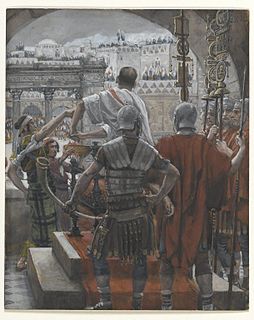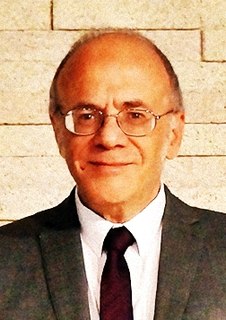Related Research Articles

The Gospel of Mark is the second of the four canonical gospels and of the three synoptic Gospels. It tells of the ministry of Jesus from his baptism by John the Baptist to his death, burial, and the discovery of his empty tomb. There is no miraculous birth or doctrine of divine pre-existence, nor, in the original ending, any post-resurrection appearances of Jesus. It portrays Jesus as a teacher, an exorcist, a healer, and a miracle worker. He refers to himself as the Son of Man. He is called the Son of God, but keeps his messianic nature secret; even his disciples fail to understand him. All this is in keeping with Christian interpretation of prophecy, which is believed to foretell the fate of the messiah as suffering servant. The gospel ends, in its original version, with the discovery of the empty tomb, a promise to meet again in Galilee, and an unheeded instruction to spread the good news of the Resurrection of Jesus.

The Gospel of Matthew is the first book of the New Testament of the Bible and one of the three synoptic Gospels. It tells how Israel's Messiah, Jesus, comes to his people and forms a community of disciples, of how he taught the people through such events as the Sermon on the Mount and its Beatitudes, and how Israel becomes divided and how Jesus condemns this hostile Israel. This culminates in his departure from the Temple and his execution. At this point many people reject Jesus, and on his resurrection he sends the disciples to the gentiles.
The question of the historicity of Jesus is part of the study of the historical Jesus as undertaken in the quest for the historical Jesus and the scholarly reconstructions of the life of Jesus. Virtually all scholars of antiquity accept that Jesus was a historical figure, although interpretations of a number of the events mentioned in the gospels vary and are a subject of debate. Standard historical criteria have aided in evaluating the historicity of the gospel narratives, and only two key events are subject to "almost universal assent", namely that Jesus was baptized by John the Baptist and crucified by order of the Roman Prefect Pontius Pilate.

The term "blood curse" refers to a New Testament passage from the Gospel of Matthew, which describes events taking place in Pilate's court before the crucifixion of Jesus and specifically the apparent willingness of the Jewish crowd to accept liability for Jesus' death.
The term "historical Jesus" refers to the reconstruction of the life and teachings of Jesus by critical historical methods, in contrast to religious interpretations. It also considers the historical and cultural contexts in which Jesus lived. Virtually all scholars of antiquity accept that Jesus was a historical figure, and attempts to deny his historicity have been consistently rejected by the scholarly consensus as a fringe theory.

The miracles of Jesus are proposed miraculous deeds attributed to Jesus in Christian and Islamic texts. The majority are faith healings, exorcisms, resurrections, and control over nature.

Jesus, also referred to as Jesus of Nazareth or Jesus Christ, was a first-century Jewish preacher and religious leader. He is the central figure of Christianity, the world's largest religion. Most Christians believe he is the incarnation of God the Son and the awaited messiah, prophesied in the Hebrew Bible.

Nicholas Thomas Wright, known as N. T. Wright or Tom Wright, is an English New Testament scholar, Pauline theologian and Anglican bishop. He was the bishop of Durham from 2003 to 2010. He then became research professor of New Testament and Early Christianity at St Mary's College in the University of St Andrews in Scotland until 2019, when he became a senior research fellow at Wycliffe Hall at the University of Oxford.

The study of Jesus in comparative mythology is the examination of the narratives of the life of Jesus in the Christian gospels, traditions and theology, as they relate to Christianity and other religions. Although the vast majority of New Testament scholars and historians of the ancient Near East agree that Jesus existed as a historical figure, most secular historians also agree that the gospels contain large quantities of ahistorical legendary details mixed in with historical information about Jesus's life. The Synoptic Gospels of Mark, Matthew, and Luke are heavily shaped by Jewish tradition, with the Gospel of Matthew deliberately portraying Jesus as a "new Moses". Although it is highly unlikely that the authors of the Synoptic Gospels directly based any of their stories on pagan mythology, it is possible that they may have subtly shaped their accounts of Jesus's healing miracles to resemble familiar Greek stories about miracles associated with Asclepius, the god of healing and medicine. The birth narratives of Matthew and Luke are usually seen by secular historians as legends designed to fulfill Jewish expectations about the Messiah.
John Paul Meier is an American biblical scholar and Roman Catholic priest. He is author of the series A Marginal Jew: Rethinking the Historical Jesus, six other books, and more than 70 articles for peer-reviewed or solicited journals or books.

Richard John Bauckham is an English Anglican scholar in theology, historical theology and New Testament studies, specialising in New Testament Christology and the Gospel of John. He is a senior scholar at Ridley Hall, Cambridge.
Samuel George Frederick Brandon was a British Anglican priest and scholar of comparative religion. He became professor of comparative religion at the University of Manchester in 1951.
Amy-Jill Levine is E. Rhodes and Leona B. Carpenter Professor of New Testament Studies at Vanderbilt University Divinity School, Department of Religious Studies, and Graduate Department of Religion.
Graham Norman Stanton (1940–2009) was a New Zealand biblical scholar who taught at King's College, London, and as Lady Margaret's Professor of Divinity at the University of Cambridge. A New Testament specialist, Stanton's special interests were in the Gospels, with a particular focus on Matthew's Gospel; Paul's letters, with a particular focus on Galatians; and second-century Christian writings, with a particular interest in Justin Martyr.

Jesus heals a man with a withered hand on the Sabbath in one of his miracles recounted in the Gospels, namely in Matthew 12:9-13, Mark 3:1-6, and Luke 6:6-11.
Philip Maurice Casey was a British scholar of New Testament and early Christianity. He was an emeritus professor at the University of Nottingham, having served there as Professor of New Testament Languages and Literature at the Department of Theology.
Christopher M. Tuckett is a British biblical scholar and Anglican priest. He holds the Title of Distinction of Professor of New Testament Studies at the University of Oxford and is a Fellow of Pembroke College, Oxford.

The following outline is provided as an overview of and topical guide to Wikipedia articles on the life and influence of Jesus.
Andrew T. Lincoln is a British New Testament scholar who serves as Emeritus Professor of New Testament at the University of Gloucestershire.
Stevan L. Davies is an author and Emeritus Professor of Religious Studies at Misericordia University in Dallas, Pennsylvania. His most notable work has been in the analysis of Christian apocrypha, especially the Gospel of Thomas. He is married to Sally Watkins Davies and has two children, Michael L. Davies and Meredith G. Russell.